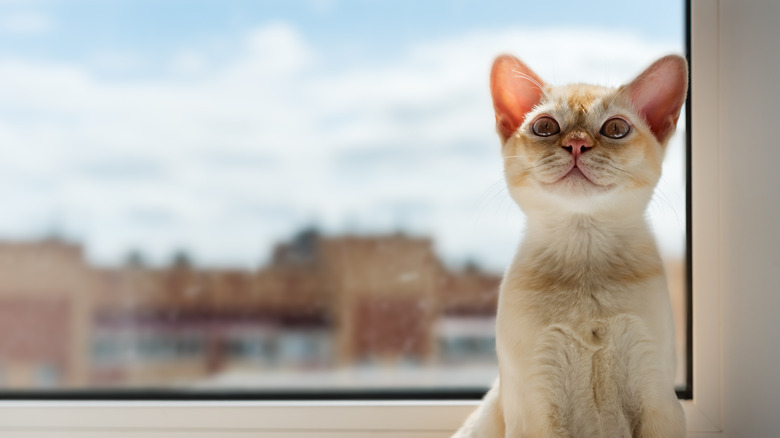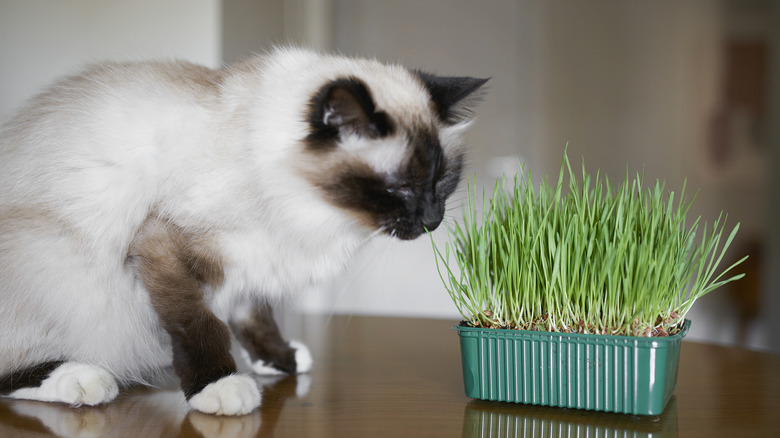The Two Types Of Cats That Have The Longest Lifespans, According To Science
As human life expectancy has more than doubled over the past two centuries — from just 30 to 40 years in the early 1900s to over 70 years globally today — we'd like to think some of this longevity dust has rubbed off on our feline friends, too. However, unlike the extensive data on human longevity, studies on feline lifespan have historically been scarce. It's only in recent years, thanks to advancements in veterinary science and a growing interest in companion animal health, that researchers have begun to uncover insights into what allows some cats to live longer than others.
Indeed, science reveals that certain cat breeds, like the Burmese and Birman, far outpace the average cat in lifespan, living well into their teens and beyond. What makes them so unique? Here's more about these two breeds of cats that enjoy the longest lifespans, and the fascinating factors that make them the champions of feline longevity.
Why the Burmese and Birman have the longest feline life expectancies
When it comes to feline longevity, two breeds consistently stand out: the Burmese and the Birman. A 2024 study in the Journal of Feline Medicine and Surgery, "Life tables of annual life expectancy and risk factors for mortality in cats in the UK," found that these breeds live significantly longer than the average domestic cat, which typically has a lifespan of around 12 years.
The Burmese cat leads the way with an average lifespan of around 14 years. Known for their affectionate and sociable nature, Burmese cats may benefit from being laid-back and forming strong bonds with their human companions. Their robust genetics, coupled with careful breeding practices, may also contribute to their exceptional longevity. Closely following is the Birman cat, with a similar average lifespan of around 14 years. Often described as gentle and easygoing, Birmans are another example of how temperament and environment may influence lifespan. Their calm disposition might parallel findings in human studies, where lower stress levels correlate with longer lifespans.
Interestingly, sex differences play a role in feline longevity, with female cats outliving male cats by approximately 16 months on average. However, these lifespan differences are not solely dictated by genetics; environmental factors, neutering status, and attentive care also play crucial roles. Go figure: A healthy, stress-free lifestyle is just as important for cats as it is for humans.
Factors contributing to feline longevity
While Burmese and Birman cats are renowned for their long lifespans, factors beyond genetics play a critical role in feline longevity. Neutering, for instance, is linked to significantly increased lifespans. According to the same 2024 UK study, intact (unneutered) "cats had 4.29 times...the odds of death before 3 years compared with neutered cats." Moreover, the researchers found that crossbred cats lived an average of 12 years, or 1.27 years longer than most purebred cats — excluding the Birman and Burmese.
Lifestyle also plays a pivotal role. Indoor cats typically outlive their outdoor counterparts, who face hazards such as traffic accidents, predators, and exposure to infectious diseases. Providing a safe, enriching indoor environment for your cat can drastically reduce these risks. Coupled with proper nutrition tailored to a cat's age and health needs, this approach helps ward off chronic illnesses and obesity, both of which can shorten lifespan. Additionally, making sure your cat gets enough water further prevents kidney and urinary issues — problems that commonly affect aging cats.
Finally, regular veterinary care is essential. Routine check-ups can detect and address health issues early, improving both lifespan and quality of life. While genetics give Burmese and Birman cats a head start, environmental factors and proactive care — i.e., selfless human love — are equally important. With the right balance of attention, safety, and health management, every cat has the potential to thrive well into their golden years.


